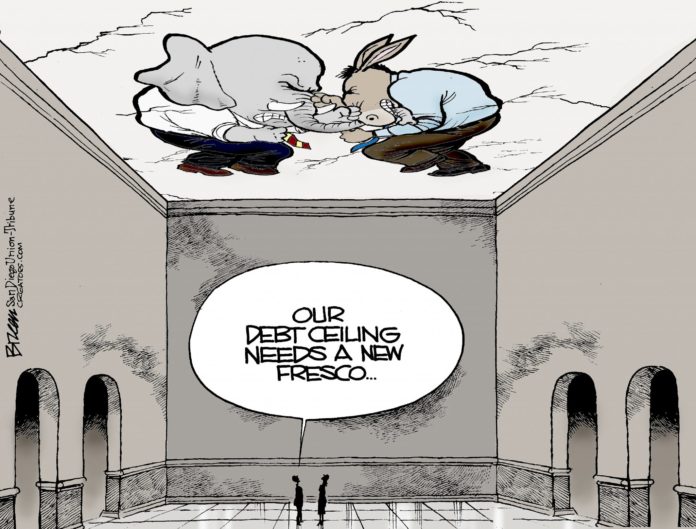BY EDWIN E. VINEYARD
Only Republicans want the issue of whether this nation pays its legitimate debts and obligations to come down to a last minute national and world economic crisis. According to rhetoric of the “tea party” Republicans, they seem to relish that as the moment of their triumph in shutting down the government. Republican rallies work up a lot of emotion, expressed in their chant, “Cut it, or shut it.” They seem oblivious to consequences of their ignorance.
They seem gaily unable to comprehend that all government obligations were duly and properly incurred as a result of budget approval and authorization by the Congress. Money has been and is being spent to pay those bills and the bonds. They don’t understand that if the government is shut down, there will be only 40% of the money there to pay bills and that a rolling debt is necessary to functioning.
So what do we do if the Republicans insist on acting irresponsibly? Perhaps we could pay part of our bills and let the others go. Perhaps we could reduce all spending to a 40% level. Surely that would please a lot of the ignorant types. We could be selective, i.e. quit paying the troops or government workers, or stop Medicare and Social Security payments. But none of these options is acceptable.
So, do we just stand around and watch the mess? No. We do whatever we have to do. So far, little mention is made of one possible legal solution.
The law says we shall pay our bills and our debts. Yea, the Constitution itself says we shall pay our bills. Amendment 14, Section 4, reads:
“The validity of the public debt of the United States, authorized by law, including debts incurred for payment of pensions and bounties for services in suppressing insurrection or rebellion, shall not be questioned.”
It would seem pretty clear from this language that the Constitution itself declares that the legitimate bills must be paid without question. It would logically follow that there can be no such thing as a “debt ceiling” for bills which have been properly and legally incurred. And, it would follow that any restraint of spending must be in its authorization by Congress through budgets and appropriations processes rather than through some after-the-fact, post action such as limiting debt.
It would seem to this “cornfield lawyer” that from a legal perspective the President of the United States has no choice but to uphold the obligation of his oath and do what the Constitution says. He must follow the directions of the 14th Amendment. He must act to pay the debts and obligations of the nation. The Constitution recognizes no authority to limit the payment of lawfully incurred debts and bills of the government of the United States, and it requires that such bills and payments be made.
This then raises the question of how such payment shall be made. Since there is no legal limit to debts, then bills would be paid in the same fashion as always – from revenues as available and the issuance of bonds for the rest. Some legal authorities might feel more comfortable if such bonds are bought by the Federal Reserve rather than sold in public sale. Others prefer the normal method be continued.
Some might see such actions as “printing money to pay debt,” although we have witnessed in “QE2” the buying up of huge sums of bonds by the Reserve. But even if it were to be true, the Constitution itself demands that it be done in one fashion or another. Any resulting inflation is due to the situation, not the solution.
What about challenges to actions of the President in conformity with the 14th Amendment? Cannot federal courts, the Supreme Court in particular, reverse such actions by making some other interpretation of the language of the Amendment? “Unlikely,” say legal authorities. They point to the lack of standing of any political personage or private citizen before the court. First, a complainant must show damage or hurt from the action, and legal authorities say this will not be possible. Congress cannot intervene in an action following the Constitution.
There is no indication that the President plans to follow any such strategy. There are signs of less optimism about an agreement or cooperation of Republicans. The President has signaled that he want an agreement by July 22, so as to enable its enactment in time to give the government time to act before the Aug. 2 deadline.
This suggests that Mr. Obama, a constitutional lawyer himself, is making a Plan B, while working on Plan A. One would think Republicans would be smart enough to have a Plan B in their arsenal as well. Most think it involves kicking the can down the road until after the 2012 elections, trying to make the issue an emotional rallying cry for the dingy wing of their party.
– Dr. Edwin E. Vineyard, AKA The Militant Moderate, lives in Enid, OK and is a regular contributor to The Oklahoma Observer







